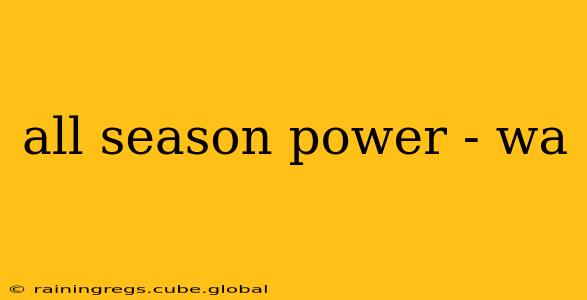Washington State, with its diverse geography and dramatic shifts in weather, presents unique challenges and opportunities for managing energy consumption throughout the year. From the mild, rainy winters of the western regions to the snowy, frigid conditions in the Cascades and the hot, dry summers in the east, understanding and adapting to these seasonal variations is crucial for maintaining comfortable living spaces and minimizing energy costs. This comprehensive guide will explore all-season power strategies for Washington residents, addressing common concerns and offering practical solutions.
What are the Biggest Energy Challenges in Washington State?
Washington faces a unique set of energy challenges due to its varied climate and reliance on hydroelectric power. While hydroelectric provides a significant portion of the state's electricity, its generation can be impacted by seasonal water levels and drought. Additionally, the state experiences periods of extreme temperature fluctuations, leading to increased demand for heating and cooling, particularly during prolonged cold snaps or heatwaves. This increased demand can strain the grid and contribute to higher energy prices.
How Does Washington's Climate Impact Energy Consumption?
Washington's diverse climate dramatically impacts energy consumption patterns. The western part of the state experiences milder winters, requiring less heating but still needing substantial energy for lighting and appliances. However, the eastern regions experience more extreme temperature swings, necessitating both effective heating in winter and cooling in summer. Mountainous areas like the Cascades experience heavy snowfall and prolonged periods of cold, demanding robust heating systems and potentially backup power solutions.
What are the Best Energy-Efficient Practices for All Seasons in WA?
Implementing energy-efficient practices is vital for managing costs and environmental impact year-round in Washington. These include:
- Insulation: Proper insulation is crucial for reducing heat loss in winter and heat gain in summer. Consider upgrading attic insulation, wall insulation, and window insulation to optimize your home's thermal performance.
- Windows & Doors: Energy-efficient windows and weatherstripping can significantly reduce drafts and heat loss/gain. Consider replacing old, drafty windows with double or triple-paned energy-efficient options.
- Heating & Cooling Systems: Regularly maintain your heating and cooling systems (HVAC) to ensure optimal efficiency. Consider upgrading to a high-efficiency furnace or heat pump for better performance and lower energy bills.
- Appliances: Choose energy-efficient appliances with high Energy Star ratings. This applies to everything from refrigerators and washing machines to dryers and dishwashers.
- Lighting: Switch to LED lighting throughout your home. LEDs use significantly less energy than incandescent or CFL bulbs.
- Smart Thermostat: Invest in a programmable or smart thermostat to optimize heating and cooling schedules based on your daily routines and preferences.
How Can I Reduce My Energy Bills in the Winter in Washington?
Winter energy costs in Washington can be substantial. Here are some specific strategies for reducing your winter energy consumption:
- Lowering your thermostat: Even a few degrees can make a noticeable difference in your energy bill.
- Using window coverings: Curtains, blinds, or shades can help insulate your windows and prevent heat loss.
- Sealing air leaks: Caulk and weatherstrip any gaps or cracks around windows and doors.
What are the Best Ways to Save Energy During Summer in Washington?
Summer in Washington can bring periods of intense heat, particularly in the eastern part of the state. To reduce your summer energy costs:
- Using ceiling fans: Ceiling fans help circulate air and can reduce the need for air conditioning.
- Keeping blinds and curtains closed: This helps prevent sunlight from heating up your home.
- Using energy-efficient appliances: Run appliances during off-peak hours if possible.
What are Some Alternative Energy Options for Washington State?
Washington is actively exploring and implementing alternative energy sources to diversify its energy portfolio and reduce reliance on hydroelectric power. Options include:
- Solar power: Solar panels are becoming increasingly popular and cost-effective in Washington, particularly in areas with ample sunlight.
- Wind power: Washington has significant wind resources, making wind energy a viable option.
- Geothermal energy: Geothermal energy is a sustainable option for heating and cooling, particularly in areas with geothermal activity.
By understanding the unique energy challenges and opportunities presented by Washington's diverse climate, and by implementing effective energy-saving strategies and considering alternative energy sources, residents can enjoy comfortable homes while minimizing their environmental impact and controlling their energy costs throughout the year. Remember to regularly maintain your systems and appliances for optimal efficiency and longevity.
